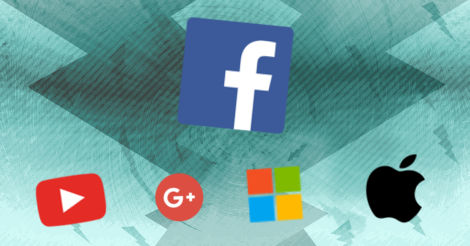Is Facebook a Monopoly?
When Mark Zuckerberg was asked by congress if Facebook was a monopoly, he mentioned competitors such as Google, Amazon, and Microsoft.

By. Jacob
Edited: 2018-04-16 14:26

Doing a 5 hour hearing, Facebook founder Mark Zuckerberg was asked mostly basic questions on privacy. Most could have been easily answered if people did their homework, which was frustrating at times, because it was a waste of everyone's time – including those of us who decided to watch the live stream. One of the more interesting questions had to do with Facebook's position as a supposed monopoly. I have always viewed Facebook as such, but I realize that may not exactly reflect reality. Plus, things can change fast in the world of technology.
While Facebook is undeniably the largest social network, with no serious competition, its function does in fact overlap with that of Google Plus, Linkedin, and even Amazon or Apple. Facebook is a technology company, and so much more than just a social networking site. Another obvious competitor is Twitter, though much less innovative, it seams.
The question is, why are these competitors not competing with Facebook in a serious way? Why is Twitter not trying to become the next Facebook? Surely it would quickly pay off if someone were to create a competitor. Currently Twitter and Google Plus provides lackluster experience compared with Facebook, and it seems mostly intentional. For instance, Twitter is limiting post-size to 280 characters, and is designed fundamentally different than Facebook.
Competitors to Facebook
If we look at Google Plus, then its clear that Google is not serious about social media. Their platform has been nerfed at least a few times, and typically when they go and redesign their sites, they end up creating a worse user experience (UX) than what they had before (at least on some devices).
The news-feed in Google Plus is a huge mess, and is difficult to understand. The layout of the news feed is confusing, where Facebook, in comparison, is straight forward and less cluttered. From a design perspective, I also think the size of the elements and white space on the page is to big.
It almost seems like G+ is not actively maintained in certain areas. For instance, I am still seeing (unnamed) "bugged" people in my circles, that I have been unable to remove, and it has been like this for several months now. If I try to remove them, the entire site will become unresponsive, and I will have to hit refresh.
G+ feels less personal than Facebook. I think it has to do with their follow concept, wheres on Facebook we add friends. It also has no private messaging feature, unlike Facebook that has a dedicated Messenger app.
Linkedin is owned by Microsoft, which makes Microsoft a direct competitor. It is noteworthy that Microsoft might also compete in other areas of tech though, such as Virtual Reality. From the social media angle LinkedIn is much less personal than Facebook, and while Facebook could serve many of the same functions as LinkedIn, I do not think LinkedIn is competing seriously with Facebook. LinkedIn is mostly business and work orientated, certain features are not free, and I see no reason why I would pay to use them. Facebook could easily fill out that same functionality, if they decided it was time.
Other social networks
While many functions and features overlap, no one is currently competing with Facebook on all social media levels. Currently it does not even seem like anyone is even attempting to create another Facebook. Other social networks tend to leave you with a lackluster experience, focused on small niche areas already covered if you are on Facebook.
There has been attempts at creating social networks from an ideological angle, which does not collect personal information or show ads. It does not take a genius to see that these models will not work, and I think this is the case for two reasons:
- There is nothing inherently wrong with the ad-supported model. So, while the intentions behind such networks might be good, the ideological grounds are not valid.
- You have to have some sort of funding. Donations may work for Wikipedia, but that does not make it ideal.
If someone chooses to run on donations, they might do it because they disagree with the ad-model and/or because they dislike online tracking and collection of personal information. However, there is very little wrong with those things if you understand how they work. The privacy aspects is blown out of proportions.
I am not saying there are not issues, but you have to be really careful about taking sides. Typically, the information collected is non-identifiable. In the case of Facebook, that is obviously not the case. But it is information people willingly give up, and it is usually information of a non-sensitive nature.

Tell us what you think: